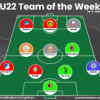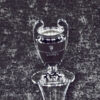Oliver McManus writes about David Moyes’ career, what might await the popular Scottish manager next.
With the resignation of David Moyes came an onslaught of criticism for the once marvelled at manager, the man tipped to be the next great thing is now being lambasted for failing to do the impossible and keep Sunderland in the Premier League.

I was listening to a 5Live radio show with Pat Nevin, Chris Sutton and Danny Mills whereby they all agreed that Moyes’ next job was make-or-break for the man, with all suggesting he’d have to drop down to Championship level before having another crack at the Premier League.
Is David Moyes a tainted man or is it just a case of right man, wrong club?
A fairly average playing career – Moyes’ main trophy of note was the Scottish Premiership – the Dunfermline defender had spent large proportions of his playing career studying managers of the time, in preparation for the managerial life.
As a result, when Preston North End found themselves manager-less in 1998 they needed to look no further than within their playing squad for their next manager – David Moyes was swiftly appointed and, from then, a managerial career blossomed.
With the club expecting to face a stern relegation battle, it was to be considered an exponential success for them to finish 15th (out of 24), 9 points clear of relegation and with a neutral goal difference.
The next season saw Moyes develop club talent as Preston battled to 5th place with a +28 goal difference and the foundations for future successes. Key to the season for The Lilywhites was astute tactics and transfers – club legend Graham Alexander joined the club half-way through the season and instantly became a crowd-favourite; his thumping penalties and endless work-rate helped transform the team into defensive stalwarts.
Going into his 3rd season at the helm, expectations were high at Riverdale and, boy, were they right to be. 95 points from the 46 match season saw Preston crowned Champions of the Second Division with an increased attacking threat – Jon Macken scored 22 league goals as the club romped to the title in style. Moyes, then, was on the map and a much touted manager.
Without giving a season-by-season breakdown of how Preston faired for the rest of David Moyes’ reign, I’ll summarise by saying that, under his guidance, the team came within a game of making it to the Premier League and gained plaudits from around the footballing circle for their constant defiance of the odds.
What I will, instead, focus on is the style of David Moyes because it was in this, opening job in which he developed his “philosophy” that he has stuck to for the rest of his career – it’s a philosophy of spending money wisely and developing the talent at his disposal via high-intensity, hands-on coaching.
In terms of philosophy, Moyes’ attention to detail is second-to-none, he’ll leave no stone unturned and, I know personally, that he has in-depth plans for every formation that he could come up against in the next fixture. He’s always looking to try something new in training, in a bid to get one-up on his opponents; he won’t always implement everything he tries out but, hey, just once in a while, something sticks.
It is this that drew the eye of Everton when they, finally, got rid of (fellow Scot) Walter Smith after a sub-par 4 year tenure. Moyes joined the club despite having 4 years left on his Preston contract and, upon signing the deal, declared he was “joining the people’s club”.
As we all know, Everton is where David Moyes really, and I mean REALLY, made his name as a coach – obviously, I’ll give an overview of Everton’s results as we go along but, this article is really about Moyes himself so the main focus will be on his personal development as a coach.
A sign of Moyes’ dedication to hands-on management came even before he signed on the dotted line for Everton – Bill Kenwright, Everton Chairman, invited Moyes to his London home in order to discuss the managerial vacancy but David Moyes was on his way from Preston to Bristol in order to scout out Nathan Ellington. He proceeded to Bristol and after the game drove from Bristol to London, met Kenwright and then went from London to Preston – a trip of some 550 miles.
This dedication found its way to the heart of Goodison and, soon enough, all the coaches were on his wavelength – getting involved with the coaching plans, taking individual sessions throughout the week and compiling pages and pages of scouting notes on hundreds of players from dozens of countries.
15th place in his first season was in keeping with their form over the past 3-4 years and his first summer transfer window saw Moyes make shrewd signings in order to improve his squad – Joseph Yobo being a notable signing, coming in initially on loan and then for a £1million permanent deal that would eventually see him spend 10 years at Goodison.
Such shrewdness secured seventh place for the Toffees, just edged out of UEFA Cup qualification on the last day by Blackburn Rovers and, for Moyes, two managerial awards in the Premier League Manager of the Month for November 2002, as well as, the LMA Manager of the Year.
A tight budget meant intelligent signings in the next summer window, with Kevin Kilbane and James McFadden but it proved to be Moyes’ worst season in charge (over his whole 11 years), with the team finishing in 17th place with 39 points
It was also a season where, for the first time, we saw elements of David Moyes’ temper which, it could be argued, was a perfect metaphor for that season – an infamous confrontation with Duncan Ferguson in training and an outburst at, referee, Steve Bennett were just two occasions in which the short fuse was demonstrated.
In terms of transfer policy, Moyes is incredibly astute and he certainly doesn’t jump into anything half-hearted. When looking at players, he derives 12 criteria for each player and asks for roughly 50 reports from 10-12 scouts before making the final decision. It is this rigour and fail-safe process that means the club and the manager can go into a transfer with full confidence of the player’s ability and potential.
During his time at Everton, many “unknown” players were signed from the lower leagues – Leighton Baines from Wigan, Phil Jagielka from Sheffield United and Joleon Lescott from Wolves being three notable examples of when this incredibly detailed scouting method has really come into its own, in terms of identifying talent that could, very easily, have been missed otherwise.
With this is mind, the board could give Moyes full faith when it came to transfers and in return they would be rewarded with consistently better table-finishes than they were seeing before Moyes’ arrival.
Particular highlights included the 2004-05 season whereby the likes of Tony Hibbert, Kevin Kilbane and Marus Bent secured an unprecedented 4th place in the Premier League; 3 points ahead of their fiercest rivals, Liverpool. 4th place also secured them Champions League football for the 2005-06 season.
From then on David Moyes found a consistent level of achievement with the club, 11th place followed by 6th, 5th and 5th again before their next standout moment in the form of the 2009 FA Cup.
An uneasy start to the competition saw the team scrape through 1-0 against Macclesfield before hitting their stride with a 1-0 win against Liverpool which really served to ignite the fire – convincing 3-1 and 2-1 wins against Premier League opposition saw them make the trip to Wembley where they faced Manchester United in front of a packed 88,141 crowd.
A gritty affair saw Everton eke out a 4-2 penalty win, to set up a showdown against Chelsea on the 30th May. And things started well with the fastest goal in FA Cup final history when Louis Saha tucked the ball in the back of the net but, unfortunately, Chelsea came on strong and emerged 2-1 winners.
The name of Louis Saha is perhaps as important in the history of the club as it is symbolic of the change implemented during Moyes’ reign – back in the weary years of 2002, the squad was made up, largely, of British players but now the club was truly international.
Players such as Mikel Arteta, Louis Saha and Marouane Fellaini all came through the famed scouting checklist and using the intense coaching methods that Everton were home to, all 3 became household name before moving on to bigger and better things.
All of this attention to detail, high intensity, stylish play was enough to catch the eye of a certain Sir Alex Ferguson who faced constant speculation of his impending retirement; and, let’s be clear, Manchester United is probably the biggest brand in the whole of football (I use brand because their standing remains the same whilst their form withers).
Everton continued to play open football, with a strong defensive line and finished in 7th, 7th and 6th before such a time as Sir Alex did, indeed, retire and with Moyes’ contract up and him being the hand-picked successor, football’s worst kept secret was finally out – David Moyes was to guide Manchester United into the 2013/14 Premier League season.
Off the back of winning the Premier League the previous season, pressure was high for Moyes and he didn’t exactly do much to boost confidence with Fellaini being the only player of note to join David Moyes at his new club, and even that was pretty uninspiring.
3 losses from the first 6 Premier League games didn’t do much to appease fans, either, as United’s new manager struggled to gain the confidence of his players who, somewhat, understandably were reluctant to fully indulge in the new coaching methods.
Part of this increased isolation of the manager was the fact he dispersed entirely of Manchester United’s trusted coaching staff and brought with him a whole raft of coaches. For him, that would have helped ease his transition to the new club but for players it would have only emphasised the change that was going on.
To be fair to David Moyes, whatever he managed to do in that first season was never going to be good enough for the United faithful – I’m not slagging off the fans, not at all, but it was always going to be a massive bump down to reality when you lose that Fergie Factor.
Nonetheless, there were some good aspects for Moyes at Manchester, the club still won more than half the games they played – 27 out of 51, at 52.94%, a figure that, for many clubs, would have been a resounding success. In fact, at the beginning of the season, it would have placed him 5th on the list of Premier League managers at the time.
Further to that, Moyes has always had a reputation for being strong at the back and cautious up the front – winning 1-0, 2-1 oftentimes as opposed to 4-0, 5-0 that might be expected at such a big club. Prior to going to Manchester United, his Premier League XIs averaged 1.3 goals per game and in the 10 months he had at Manchester United (34 Premier League games), his team averaged 1.62 goals per game.
Now that’s a marked improvement for the man, and whilst it did resemble .6 of goal per game less than the season before, it showed that Moyes, as a manager, was capable of development and adaptation. He wasn’t going to go into Manchester United with a set, robotic structure of “this is how we must play” – he was flexible. Equally, the squad maintained their tight back-line, with them conceding the exact same amount of goals as they did the season before.
The season was undeniably, though, littered with high-profile calamities from the very outset; his first game in charge was a 1-0 defeat to Singha All Stars, in Bangkok, and similar silly losses haunted them throughout Moyes’ tenure.
As mentioned earlier, United has suffered their worst ever start to a Premier League season (3 losses from the first 6 games) and it was always going to be hard for David Moyes to fight back from that. The thing about Moyes is that he’s used to working for clubs with, relatively, small expectations and constantly punching above their weight. Now, however, he found himself at a massive club with massive expectations.
The whole dressing room dynamics would be completely different, because Moyes was able to reassure his players in the past and, rarely, had to bawl them out (due to the over performing that he managed to squeeze out of them). For quite possibly the first time in his managerial career, he needed to absolutely nail his players to the wall and, I wonder, if he had the confidence and ability to do this effectively.
Another key mistake he made was to declare, just 15 games in, that he took “complete responsibility” for United’s poor form. NO, NO, NO, NO, NO, what are you doing David?! This man needs to take a serious PR lesson, never do you declare it’s your fault. We all know that, always deflect the blame because, if we’re being brutally honest, the players go out and put the performances in, if they’re not doing well then blame then instead of taking the flak yourself.
On 22nd April 2014, after days and days of speculation, Manchester United confirmed that they had sacked David Moyes. He was in charge for just 10 months, less than a year into his 6-year contract and, even though legends like David Beckham called for patience, he ultimately paid the price.
And I think, for all his faults, everyone can agree that he should have been given more time. I mean, there are lasting signs of his legacy in the United squad to this day. Juan Mata, signed in the winter transfer window is, unquestionably, a key cog in the team and, even, Marouane Fellaini is still knocking around and was even captain for a game earlier this season.
What did he learn from his time at Manchester United, then? Well, he learned not to dive straight in at the deep end, to keep continuity and gradually ease in changes, not to expect immediate success and, more importantly, to be a bit diplomatic with your answers – don’t take all the blame!
You’d assume a bit of time off might be needed for David Moyes after such a gruelling 10 months but you’d have been wrong – 7 months later, he surprised the world by taking another job. Not just any old job either – the Real Sociedad vacancy.
I think it’s fair to say, no-one saw that move coming but it did show ambition from the, then, 50 year old in that he wasn’t willing to sit around waiting and was happy to expand his horizons by experiencing a different culture.
The club was lying in 15th place and so expectations were fairly minimal and, to all intents and purposes, he managed to guide the club to a comfortable finish in his first season – a particular highlight being a 1-0 win against Barcelona which saw many people compare his style of management to that of his Everton era as opposed to that of his time at Manchester.
The 10 games of that 2014-15 season before Moyes arrived yielded just 6 points but those next 28 saw the team take home 40 points – an obvious improvement. Although their 12th place finish was 5 places lower than the season before, they were always going to struggle given that they had failed to sufficiently replace Antoine Griezmann.
What’s the one thing I’ve been saying throughout this article? Moyes is a defensive stalwart, he played at the back so it’s only natural that he would be particularly strong in this area and that’s exactly what he’s been doing throughout his career – Sociedad was no exception.
2013-14 saw the club ship 55 goals in their 38 games – at 1.45 goals per game – and when David Moyes came in they conceded just 36 goals from 28 matches, at an average of just 1.29 goals per game. Now, it was too late for transfers by the time Moyes arrived and they made no signings in the winter window so here he is going back to his roots – working with what he’s got and making a bloody success of it.
But I think some people in Britain didn’t entirely appreciate what he was doing out in Spain, it’s easy to look at a league table and think “oh, 12th place, minus 7 goal difference, he’s not doing too well out there” but he genuinely was.
Just like at Everton, just like at Preston North End, the chips were in his favour and he was working with them, the club, and the fans in order to build foundations for success – it’s what he’s good at, he really is.
Unfortunately for David Moyes, the patience of Real Sociedad’s board grew thin because they didn’t want to wait for success (I don’t know why they thought it would come particularly quickly, mind) and just 11 games into his second season, he was sacked by the club; it was rather harsh, to be honest, with 3 tough draws, 2 convincing wins and then 3 battling losses all a part of those matches.
I think, in all honesty, his time at Sociedad can be considered a reasonable success. For someone who doesn’t speak the language it’s always going to be tough to make an impact and he made a good fist of it – I suspect that if we look at how Gary Neville fared at Valencia, we may well think a hell of a lot more of what Moyes achieved during his time in Spain.
All this, ALL THIS, and still the man refused to take a significant career break – on the 23rd of July, he was appointed manager of Sunderland
And I’m not going to go into detail about the season because we all know what happened there – the Black Cats were relegated in spectacular fashion with just 24 points and a mere 6 wins.
HOLD UP though, that defensive impact that Moyes inputs didn’t go amiss – the club conceded just 2 goals less than the season before (When they finished in 17th) an just 4 goals less than in 2013-14 (when they finished 14th) – does the miracle of Moyes ever stop?!
In all honesty though, Sunderland were always going to be in the relegation dogfight, having been lucky enough to avoid the drop since the 2012-13 season. Having said that, the way they went down wasn’t pretty and it’s pretty hard to defend either Moyes or the team for their performances. When you’ve spent in excess of £35,000,000 on signings, it’s always going to be hard to justify such poor, poor displays.
There is one small positive and, trust me, it really is small – that being Jermaine Defoe. Defoe managed to serve as a small credit to the man-management skills of David Moyes who helped rejuvenate the career of Defoe, who hit 15 goals in the season; more than the rest of the squad put together.
It was a terrible season but it was predictably terrible and you find yourself scratching your head thinking why, WHY on earth did David Moyes take this job – it was doomed from the very beginning.
Now that he’s resigned from Sunderland, where does Moyes go from here and, frankly, is he damaged goods?
I’ll answer that question but don’t be afraid to think of your own – I think David Moyes has to drop down a level, to the Championship with a mid-level team in order to rebuild his reputation; a club which could be his next Preston North End, a long-term project. I fear if, as suggested, he moves to China or Scotland then that could be the end of his credible career.
Is he damaged goods? 100%. But he’s still a good manager, a very good manager. He’s been dealt some tough hands in the last couple of deals but he’s got to get back on track, gain some confidence and with that the results will flow.
I’m not some Moyes fanatic but he seems like a decent guy who’s been hard done by, I do hope he lands on his feet otherwise we could be seeing the last of a man who had so much to offer.
- Syria: The path to World Cup qualification - July 8, 2020
- The story of South Africa’s topsy-turvy footballing journey - November 8, 2017
- Interview: Sunil Chhetri on his foreign stints, Bengaluru FC, and the rise of Indian football - October 24, 2017
























































